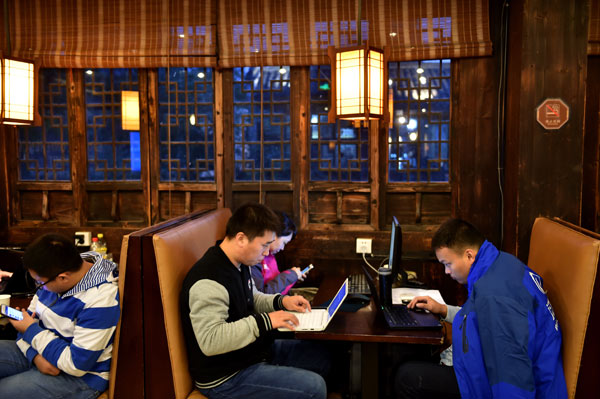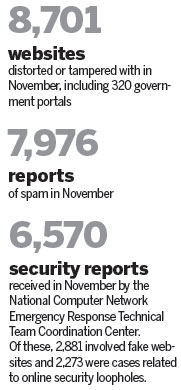Year-ender: State bolsters online security
By Cao Yin (China Daily) Updated: 2015-01-05 07:50
With one of the world's largest online and mobile communities, China is facing increasing pressure to beef up its cybersecurity.
|
People surf the Internet in Wuzhen, Zhejiang province, on Nov 20, as the first World Internet Conference entered its second day. Liang Zhen / for China Daily |
National strategy rolled out to deal with cyberthreats both at home and abroad
With one of the world's largest online and mobile communities, China is facing increasing pressure to beef up its cybersafety.
From March to May, more than 50,000 attacks from at least 2,000 Internet protocol addresses in the United States were launched on Chinese computers.
The backdoor attacks, which bypass authentication systems to access computers and data, were carried out using nearly 2,000 Chinese websites.
The figures from the National Computer Network Emergency Response Technical Team Coordination Center, China's cybersecurity monitoring agency, highlight the increasing importance of Internet security in a country with one of the largest digital communities.
To deal with growing threats online and protect the country's interests, cybersecurity has been upgraded to a national strategy.
In February, President Xi Jinping gave orders for a central Internet security and informatization leading group, which he will personally head, to deal with these issues at the top level.
During a conference on the group, the president said cybersecurity involved not just a country's security and development, but also the lives of its people.
China's online population reached at least 632 million by the end of June 2014 and mobile Internet users totaled 527 million, figures from research organization China Internet Network Information Center showed.
The latest figures from the country's network monitoring center also showed that, from January to October 2014, at least 8.79 million Chinese computers had been infected or controlled by online threats such as Trojans and botnets.
Of these computers, more than 90 percent were attacked from overseas.
Earlier last year, The New York Times reported that the US National Security Agency had hacked into computers of Huawei and other telecommunication giants such as China Telecom, with documents leaked by former NSA contractor Edward Snowden showing the extent of US online spying worldwide.
In line with the upgraded national strategy to deal with such threats, the Cyberspace Administration of China, the country's Internet watchdog, is gearing up to boost security.
Security checks on information technology products and services will be imposed. Foreign and domestic IT goods, services and suppliers of information systems related to national security and the public interest must be reviewed if they want access to the Chinese market.
Ni Guangnan, an academician at the China Academy of Engineering and a top computer scientist, said the information systems used by government departments urgently need these moves.
Wang Jun, chief engineer at the China Information Technology Security Evaluation Center, said that these will also help Chinese technology and network giants improve their products and services.
"Many countries have enforced such a review," Wang said, citing the US House Permanent Select Committee on Intelligence as an example.
The committee conducted a security investigation on Chinese IT companies in 2012 and finally forced Huawei to exit the US network equipment market, he said.
Although details of the policy have yet to be released, Yang Chunyan, deputy director of the cybersecurity bureau at the administration, said in November that studies on the issue are being pushed forward.
- Govt encourages people to work 4.5 days a week
- Action to be taken as HIV cases among students rise
- Debate grows over reproductive rights
- Country's first bishop ordained in 3 years
- China builds Tibetan Buddhism academy in Chengdu
- Authorities require reporting of HIV infections at schools
- Typhoon Soudelor kills 14 in East China
- Police crack down on overseas gambling site
- Debate over death penalty for child traffickers goes on
- Beijing to tighten mail security for war anniversary









